Khoury at 40: Anniversary kickoff celebrates past achievements and future goals
Author: Milton Posner
Date: 10.07.22
On September 28 — joined by alumni and luminaries of the past, as well as students, scholars, and industry partners of the present — one of the world’s first computer science colleges celebrated a milestone.
The event began a yearlong celebration of Khoury College’s 40th anniversary. More events will follow, each one hosted by a different Northeastern campus and focusing on a different dimension of Khoury College’s impact, and culminating with a showcase of student and faculty innovation in May. Fittingly, the kickoff presented a bird’s-eye view of the Khoury story, with Northeastern President Joseph E. Aoun, college benefactor Amin J. Khoury, and deans past and present capturing the trajectory of a college that has spent four decades pushing the boundaries of computer science education and research.
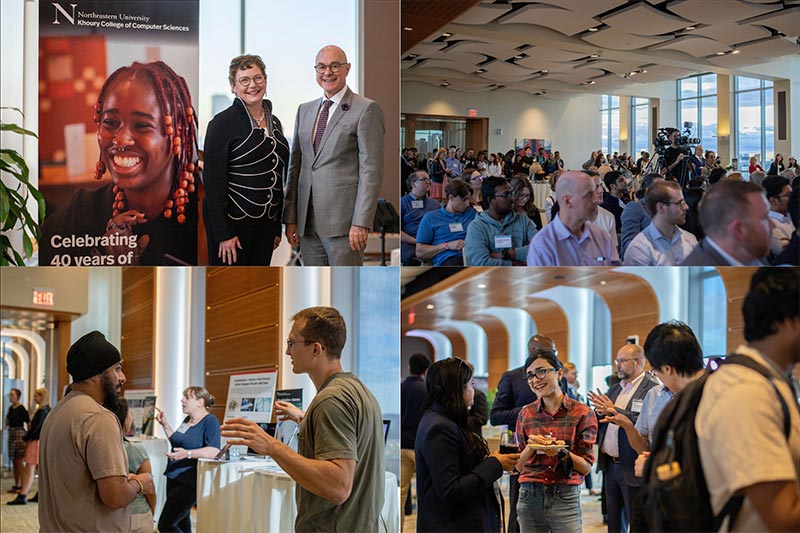
“The decisions made by Northeastern and Khoury College have allowed us to become one of the first standalone colleges of computer science, to chart a path with combined majors, to span the global network,” Dean Elizabeth Mynatt said. “Whenever possible, we’ve taken the nontraditional, the strategic, the visionary route.”
The past, the panel, and putting things together
Forging something genuinely new and distinct takes love and labor, a reality no one understands better than the six leaders who participated in the event’s panel, and who Mynatt lauded for “fostering an environment of innovation and laying the groundwork for our future.”
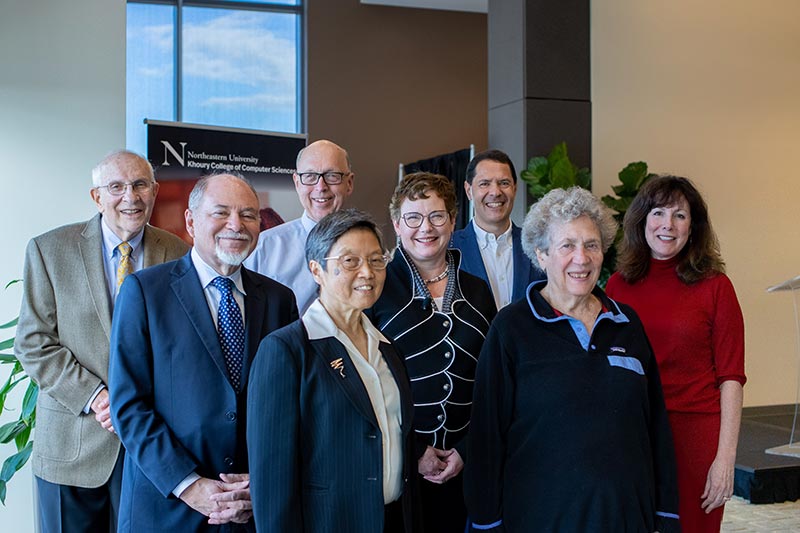
When Northeastern carved out the College of Computer Science from existing colleges in 1982, few universities offered undergraduate CS degrees, let alone graduate degrees or dedicated programs.
“We added concentrations and choices to the curriculum, enabling undergraduates to take classes outside of computer science,” Professor Emeritus Betty Salzberg replied to the opening question from panel moderator Javed Aslam. “We could not have done this if we’d had to satisfy the degree requirements of another college.”
CCS began with 11 (mostly math) professors and immediately began to bolster both its reputation and its undergraduate ranks.
“We built a culture of professionalism because as a new college we needed to produce documents, tenure dossiers, and the like to earn respect from other colleges,” said Mitch Wand, former associate dean of graduate programs. “I’m very pleased to see how that culture grew.”
The college’s numbers grew too. But when the number of undergraduate CS majors dropped in the 1990s, CCS still faced the threat of a merger. Recognizing the growing appetite for computer-capable professionals in business, CCS centered its strategy on making students more competitive in the workplace, and made combined majors a key focus.
“We hoped that drawing from a larger pool would increase our enrollment,” said Larry Finkelstein, who helmed the college as dean for 20 years. “We realized that to make combined majors work, we needed interdisciplinary faculty, and hiring them was no mean feat. You have to deal with tenure in two departments. There were no ground rules; it was all worked out in a back room.”
In the following years, the ground rules solidified. Northeastern’s computing students responded to the structure and convenience of combined degrees. The college learned to build thorough, thoughtful curricula with other Northeastern departments. The college now has 43 combined computing majors — more than one fifth of Northeastern’s total — and more than double the next-closest university.
“For the first time, Khoury College touches every undergraduate college at Northeastern through combined majors,” said Professor Emeritus Richard Rasala, who credited associate deans Alan Mislove and Ben Hescott for spearheading the effort in recent years.
This interdisciplinary focus, once established, became the bedrock for further expansions. Prominent among those — according to Agnes Chan, former executive director of information assurance and cybersecurity — was the move into cybersecurity work. Northeastern received a special NSA designation in 2008, and now hosts both the Institute of Information Assurance and the Cybersecurity and Privacy Institute.
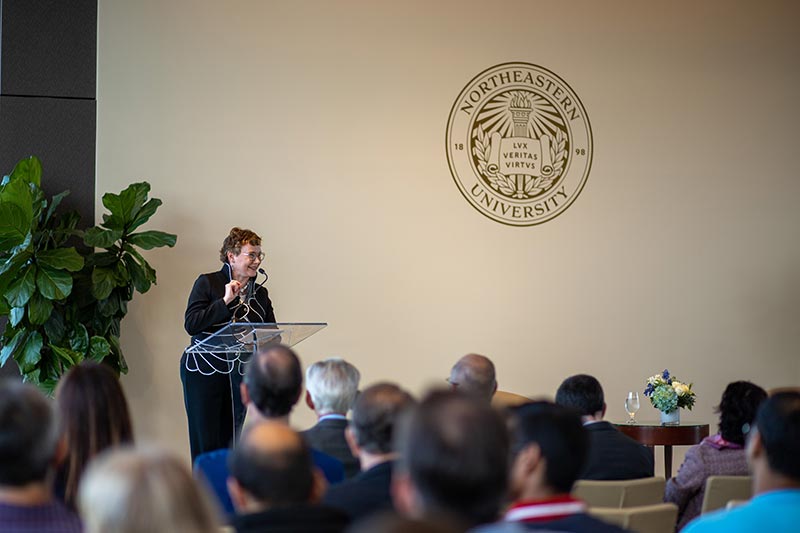
“You each played a pivotal role in moving the Khoury story,” Mynatt said after the panel concluded, “by expanding our programs, increasing our combined majors, establishing our research portfolio, and expanding our footprint across the network.”
Endowed by its namesake
Amin Khoury, who earned his MBA from Northeastern before founding several successful medical and aerospace businesses, may not strike you as the likeliest steward of computer science education. But that didn’t deter him from recognizing the promise of the field.
In 2018, Khoury endowed the college, known since 2002 as the College of Computer and Information Science, with a $50 million naming gift. In the years since, the Khoury College of Computer Sciences has established itself as the fastest-growing CS college in the country, with 7,500 enrolled students and 11,000 alumni. On Wednesday, with President Aoun beside him, Khoury explained how and why he decided to invest in the college.
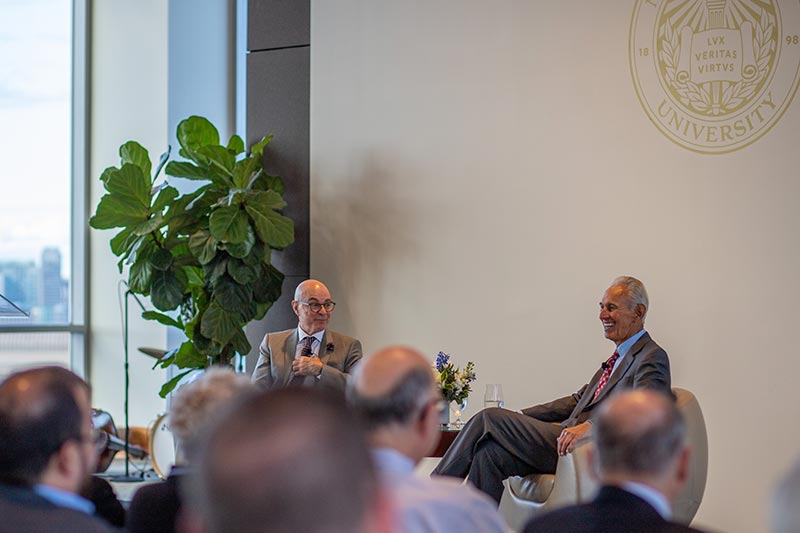
“Computer science will be embedded in every industry and course of study,” Khoury said. “My two sons are also entrepreneurs, and together we’ve been fortunate to make enough money to give back, which is much more fun than starting or building a company. There’s nothing more gratifying than positively impacting someone’s life.”
During the course of the conversation, three throughlines emerged. One was geographic reach, with Aoun noting that “Khoury College was the first Northeastern college to take advantage of the global university system” and Khoury adding that “we’re training computer scientists in California, in London, in Arlington, in Massachusetts, in Vancouver.”
Another was increasing gender and ethnic diversity, for which Khoury credited Mynatt, former college dean and current Dean of Inclusive Computing Carla Brodley, and the Align program.
“We didn’t know whether Align would succeed, but then Carla scaled it up, and it became a model,” Aoun recalled. “It showed that your undergraduate learning doesn’t have to determine what you do next. That’s huge.”
For her part, Brodley cited a critical change in the college’s PhD admissions philosophy.
“Prior research experience is a form of economic privilege, and is not an indicator of how well graduate students will do,” Brodley explained, noting that after de-emphasizing prior research experience, “we had one of the most diverse PhD classes ever join us this fall.”
Finally, the conversation turned to interdisciplinarity, which Amin Khoury counted as key to “training tomorrow’s leaders.”
“Some of my Khoury colleagues say that computer science is a lingua franca every student should have,” Aoun added. “Then they went a step further and said, ‘We want every student versed in data literacy and human literacy.’ And they’ve manifested that through combined majors.”
“The students here are here because they want to learn for the next stage of their lives,” Khoury concluded. “They’re hardworking, they’re aggressive, and they’re wonderful to be around.”
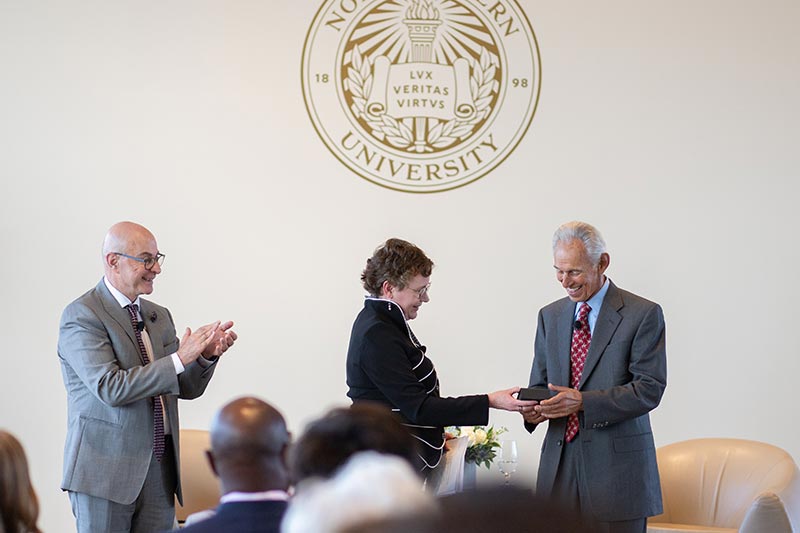
The next 40 years
Amid the celebration of the journey so far came more than a few nods to the future. Chief among those nods was Chris Jelly.
As part of the 40 for 40 initiative honoring influential figures in the college’s history, Mynatt presented awards to Amin Khoury and all six panelists. But the final honoree of the evening was Jelly: head of software engineering at Vestaboard, owner of a consulting service for startups, and founder of the Jelly Incubation Fund, which offers grants to Khoury College students who have unique, self-directed CS ideas.
READ: Computer science idea, but no funding? This alum can help.
It was yet another way in which Khoury College, now entering its fifth decade, is striving to empower the people and ideas the field hasn’t always welcomed.
“The mission of CS for Everyone encapsulated the interdisciplinary nature, the idea that computer science touches everyone everywhere,” Brodley said, “but also that everyone should feel welcome to come to computer science.”
For more on Khoury College’s 40th anniversary, including events and an interactive timeline of the college’s history, click here.
Subscribe to the Khoury College newsletter
The Khoury Network: Be in the know
Subscribe now to our monthly newsletter for the latest stories and achievements of our students and faculty